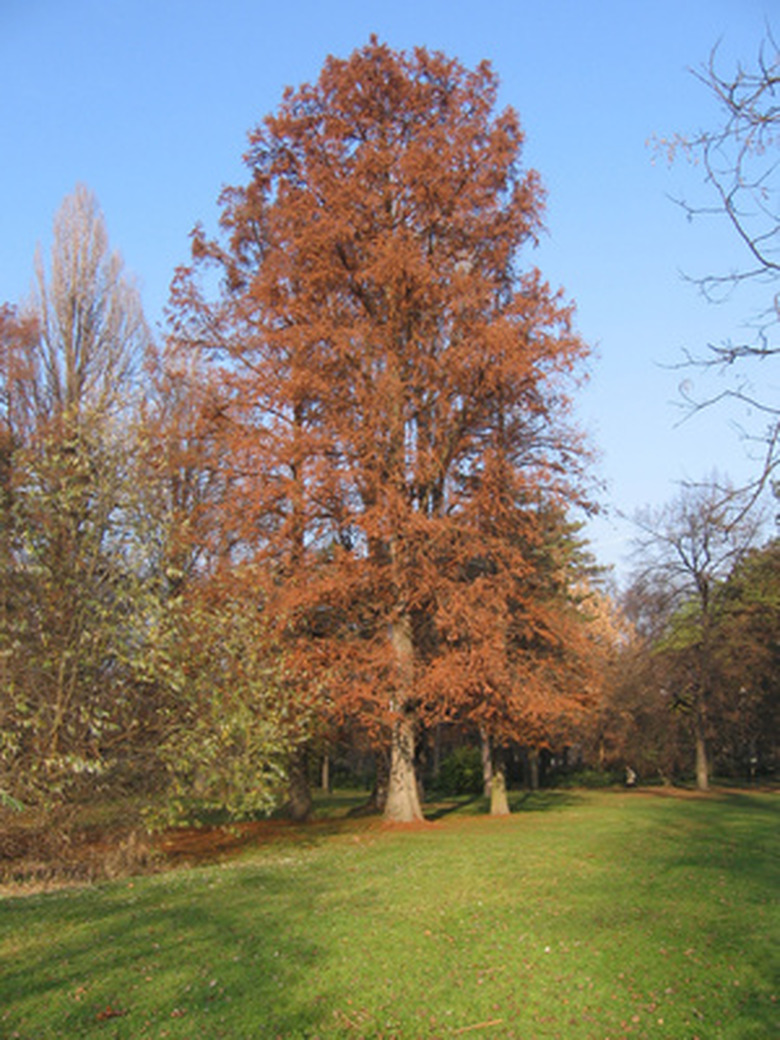Different Kinds Of Cypress Trees
Cypress trees generally belong to the Cupressaceae or Taxodiaceae plant family. These conifers bear green, needle-like leaves and pinecones. Gardeners should select cypress trees according to the plant's mature size, appropriate hardiness zone, needle color and general culture. Many different kinds of cypress trees grow well in the United States.
Nootka Cypress
The nootka cypress (Chamaecyparis nootkatensis), also called the yellow cypress, naturally occurs along the Pacific coastline and performs well in United States Department of Agriculture (USDA) Hardiness Zones 4 to 7. This member of the Cupressaceae plant family reaches between 40 and 90 feet in height and 15 and 25 feet in width. Nootka cypress prefers fertile, moist soils in partly to fully sunny locations. This kind of cypress tree grows best in areas that experience cool, moist summers. Nootka cypress trees feature rounded pinecones, gray bark and sprays of blue-green leaves. Juniper blight and bagworm infestations occasionally occur. Most gardeners use the nootka cypress as a landscape tree.
- Cypress trees generally belong to the Cupressaceae or Taxodiaceae plant family.
- Nootka cypress trees feature rounded pinecones, gray bark and sprays of blue-green leaves.
Hinoki Cypress
The Hinoki cypress (Chamaecyparis obtusa), a member of the Cupressaceae plant family, comes from Japan and grows well in USDA Hardiness Zones 4 to 8. Mature trees reach from 50 to 75 feet in height with spreads ranging from 15 to 25 feet. Hinoki cypress trees, sometimes called Hinoki false cypress trees, prefer full sun positions and fertile, moist soils. Gardeners should plant this cypress in sites that protect it from the wind. Hinoki cypress trees have pyramidal forms, red-brown bark, orange-brown pinecones and deep green leaves with white markings on the undersides. Gardeners often plant these cypress trees as hedges, rock garden plants and screens.
Pond Cypress
Mature pond cypress trees (Taxodium distichum var. imbricatum), sometimes called hat-rack cypress trees, range from 30 to 70 feet in height and 15 to 20 feet in width. Winter hardy in USDA Zones 5 to 9, the pond cypress naturally thrives along the east coast from Florida to Virginia. This hardy tree in the Taxodiaceae family has few disease or pest problems. Pond cypress trees prefer moist, sandy soils, but tolerate very wet soil conditions. These trees feature flattened crowns, gray or red-brown bark and green leaves that turn orange shades in the autumn. Gardeners often use this tree in low areas near ponds, streams or lakes.
- The Hinoki cypress (Chamaecyparis obtusa), a member of the Cupressaceae plant family, comes from Japan and grows well in USDA Hardiness Zones 4 to 8.
- Hinoki cypress trees have pyramidal forms, red-brown bark, orange-brown pinecones and deep green leaves with white markings on the undersides.
Bald Cypress
The bald cypress tree (Taxodium distichum) features purple-green pinecones and yellow-green needles that turn orange to red-brown in the autumn. This long-lived cypress variety typically reaches heights between 50 and 70 feet in garden settings. Native to American swampland and bayous, the bald cypress performs well in USDA Zones 4 to 9. This tree prefers sandy, acidic soils in fully sunny locations. Bald cypress trees sometimes suffer from chlorosis when planted in alkaline soils. Gardeners often use the bald cypress as an ornamental tree for larger lawns.
